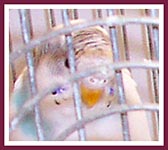 HEALTHBEAT: Diseases jump from animals to
humans HEALTHBEAT: Diseases jump from animals to
humans
The Associated Press
Published June 9, 2003 WIMonkeypoxAnimals
WASHINGTON - The monkeypox outbreak
illustrates a growing problem: Exotic animals give exotic diseases to people
who get too close, a trend that some medical specialists call a serious public
health threat.
Such diseases
can become a threat not just to the people who buy and sell exotic pets, but to
the general public if they spread to native animals and become established in
the United States. Federal health officials are working frantically to ensure
that doesn't happen with monkeypox.
"This is
a harbinger of things to come," warns Michael Osterholm of the University
of Minnesota, who advises the government on infectious disease - and has long
warned that there's too little oversight of the health threats of imported
animals.
"There
are some of us who feel like lone voices in the night" in calling for
better scrutiny, adds Peter Jahrling, a scientist at the U.S. Army Medical
Research Institute. "Perhaps incidents like this might bring some
much-needed re-examinations."
Monkeypox, a
relative of smallpox usually found in tropical African forests, apparently
jumped from an imported Gambian giant rat into prairie dogs when both species
were being housed together by an exotic pet distributor in Illinois.
Health
officials are investigating nearly three dozen possible cases of monkeypox in
people who bought or cared for the prairie dogs, in Wisconsin, Indiana and
Illinois. The outbreak marks the first time monkeypox has been detected in the
Western hemisphere.
Nor is it the
only threat, say critics who fear a growing trend.
SARS, the
respiratory epidemic, is thought to have come from civet cats bred as an exotic
meat in Chinese markets where bats, snakes, badgers and other animals live in
side-by-side cages until they become someone's dinner.
Japan
recently banned the importation of prairie dogs because they can carry plague.
The rodents had been wildly popular as pets in that country.
Just last
summer, a group of prairie dogs caught in South Dakota was discovered to have
another dangerous infection, tularemia - noticed only after the animals were
shipped to 10 other states and five other countries. While the Centers for
Disease Control and Prevention never recorded any human illnesses, it advised
adults who handled the ill rodents to take precautionary antibiotics.
Then there's
salmonella, which iguanas and other reptiles, as well as birds, routinely shed
in their feces. The CDC counts a stunning 90,000 people a year believed to have
caught salmonella from some form of contact with a reptile, either touching it
or touching a surface where the reptile had tracked the bacteria.
A common
scenario, Osterholm says: Parents wash the reptile cage in a bathtub or sink
their child uses, and the child gets sick. Salmonella can be life-threatening
in children.
Worse is if a
disease jumps from exotic pets into native wildlife - a threat whenever owners
dump an animal that gets too large or tiresome to care for.
CDC's Dr.
Steve Ostroff made a plea Monday for prairie-dog owners not to release their
animals into the wild, but to call a veterinarian or their state health
department for proper care information. Call ahead before taking a sick prairie
dog to a veterinary clinic to guard against possible exposure of other animals
to monkeypox, he said.
Already, a
sick prairie dog has infected a rabbit who lived in the same house; Jahrling
worries that hamsters and gerbils could be incubating monkeypox from pet-store
transmission; in Africa, squirrels carry the virus.
"Even if
we do manage to bring the prairie dog problem under control, it's very
important that we keep our guard up" by watching for monkeypox in other
species, Ostroff said Monday.
There are no
good counts of how many exotic animals are sold, but they're immensely popular,
says Richard Farinato, director of the Humane Society of America's captive
wildlife program. Some 800,000 iguanas alone are imported for the pet trade.
There is
little federal scrutiny of most imported animals for potential human health
risk, and rules on owning and selling exotic animals vary by state and city.
"We have
a policy that says don't buy these kinds of animals as pets. This (monkeypox)
is one example of why," Farinato says.
But even the
critics aren't immune to the lure of exotic pets. Osterholm several years ago
let his teenage son buy an African dwarf hedgehog, another pet fad - on
condition that it be tested for disease. Osterholm's laboratory found the
animal harbored three strains of salmonella never before seen in Minnesota.
They kept the
hedgehog, but "extreme hand washing took place," Osterholm recalls.
"It wasn't that fun."
EDITOR'S NOTE - Lauran Neergaard
covers health and medical issues for The Associated Press in Washington.
|

